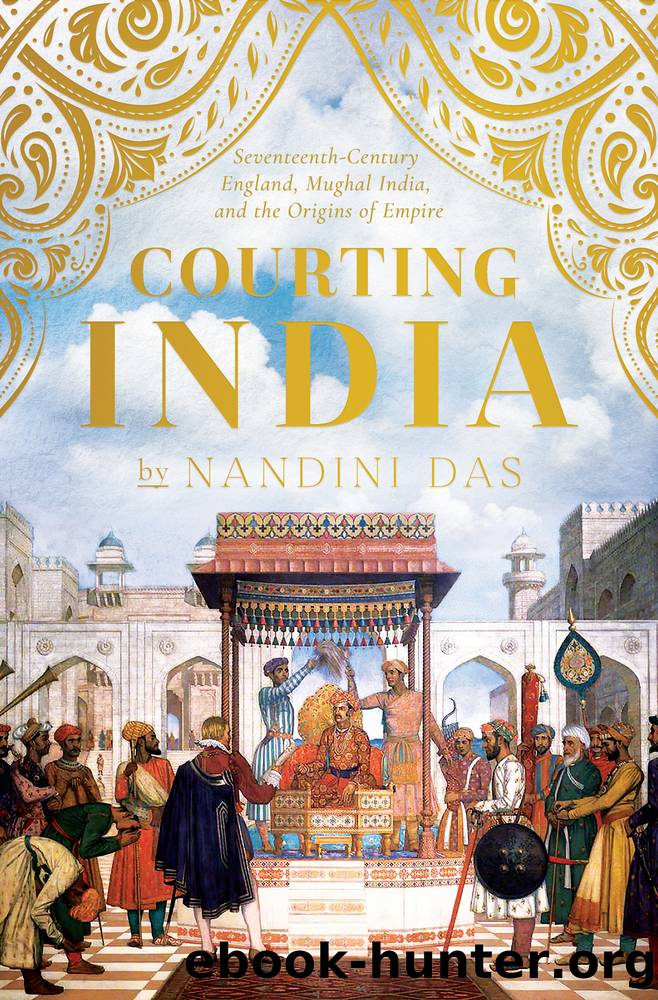Courting India: Seventeenth-Century England, Mughal India, and the Origins of Empire by Nandini Das

Author:Nandini Das
Language: eng
Format: epub
Publisher: Pegasus Books
Published: 2023-04-04T00:00:00+00:00
* * *
There was another reason for the rush to smooth over his disagreements with Khurram, no matter what he thought of him in private. Internal strife within the imperial family was all the news. Jahangir had crushed the rebellion of his eldest son, Khusrau, ruthlessly. When he had been blinded by his fatherâs orders in 1607 after a second attempt to overthrow Jahangir, it had effectively ruled Khusrau out from ever becoming a viable challenger to the throne again. For years, Khusrau had been imprisoned under the care of Jahangirâs fierce and loyal Rajput follower, Ani Rai Singhdalan. Only two competitors for the Mughal throne remained, his younger half-brothers, Parvez and Khurram. The youngest, Shahryar, was only eleven. His time to enter the fray was yet to come.
As the temperature dropped in Ajmer at the beginning of autumn, those in the know at court said that Khurram, with the help of his stepmother Nur Jahan and his father-in-law Asaf Khan, had crept ahead in the race for the throne. The conquest of the Deccan was the great Mughal dream. Khandesh, Golconda, Bijapur and Ahmednagar, the four major sultanates of the Deccan, covered an area that roughly stretches across modern Maharashtra, Karnataka, Telengana and Andhra Pradesh. Of these, Akbar had only managed to annexe Khandesh in northern Maharashtra, and Jahangir was determined to achieve what his father had failed to complete. There were other, more immediate political reasons too. To the Shiâa Muslim dynasties of the Deccan, the Mughals were a Sunni incursion from the north. The rulers of Bijapur and Golconda recognised Shah âAbbas of Persia as their rightful Shiâa leader instead. For the moment, hemmed in by the Sunni empires of the Ottomans and the Mughals, Shah âAbbas had neither the time nor the inclination to enter into a direct confrontation with Jahangir. But as far as the Mughals were concerned, the danger of a pincer attack by Persian forces from the north and the Deccan forces from the south always remained. Enormous Mughal resources went into mobilising military forces against the rebel army of Ahmednagar, led by the former Ethiopian slave and formidable guerrilla strategist, Malik Ambar. In 1608, Jahangir had sent Abdur Rahim Khan-i-Khanan to deal with Ambarâs forces, but he had failed spectacularly. So had Prince Parvez. Now, Khurram, fresh from his triumphant campaign in Mewar, Rajasthan, was going to take his place as the overall commander of the Deccan armies. Parvez, on the other hand, was going to be sent to the distant province of Bengal, far from all the action, and more importantly, far from access to his father.
Roe makes no secret in his journal about his continuing distrust of Khurram. âThe ambitions of this young Prince are open, the Common talke of the People,â he wrote on 10 October.23 He did not believe that Jahangir really intended him to be the heir, âfor Sultan Cursoronne [Khusrau], the Eldest brother, is both extreamly beloved and honored of all men, almost adored, and very
Download
This site does not store any files on its server. We only index and link to content provided by other sites. Please contact the content providers to delete copyright contents if any and email us, we'll remove relevant links or contents immediately.
| Central Asia | Southeast Asia |
| China | Hong Kong |
| India | Japan |
| Korea | Pakistan |
| Philippines | Russia |
The Sympathizer by Viet Thanh Nguyen(4385)
The Rape of Nanking by Iris Chang(4203)
World without end by Ken Follett(3474)
Ants Among Elephants by Sujatha Gidla(3463)
Blood and Sand by Alex Von Tunzelmann(3195)
Japanese Design by Patricia J. Graham(3167)
The Queen of Nothing by Holly Black(2587)
City of Djinns: a year in Delhi by William Dalrymple(2554)
Foreign Devils on the Silk Road: The Search for the Lost Treasures of Central Asia by Peter Hopkirk(2463)
India's Ancient Past by R.S. Sharma(2451)
Inglorious Empire by Shashi Tharoor(2437)
Tokyo by Rob Goss(2427)
In Order to Live: A North Korean Girl's Journey to Freedom by Yeonmi Park(2386)
Tokyo Geek's Guide: Manga, Anime, Gaming, Cosplay, Toys, Idols & More - The Ultimate Guide to Japan's Otaku Culture by Simone Gianni(2368)
India's biggest cover-up by Dhar Anuj(2350)
The Great Game: On Secret Service in High Asia by Peter Hopkirk(2344)
Goodbye Madame Butterfly(2250)
Batik by Rudolf Smend(2179)
Living Silence in Burma by Christina Fink(2068)
